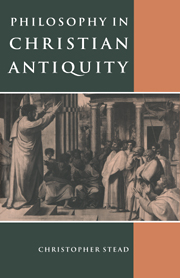Book contents
- Frontmatter
- Contents
- Preface
- List of abbreviations
- PART I THE PHILOSOPHICAL BACKGROUND
- PART II THE USE OF PHILOSOPHY IN CHRISTIAN THEOLOGY
- 8 The debate about Christian philosophy
- 9 Greek and Hebrew conceptions of God
- 10 Proofs of the existence of God
- 11 God as simple unchanging Being
- 12 How God is described
- 13 Logos and Spirit
- 14 Unity of substance
- 15 Substance and Persons
- 16 Christ as God and Man
- 17 Two natures united
- PART III AUGUSTINE
- Bibliography
- Index of Names
- Index of Subjects
9 - Greek and Hebrew conceptions of God
Published online by Cambridge University Press: 29 September 2009
- Frontmatter
- Contents
- Preface
- List of abbreviations
- PART I THE PHILOSOPHICAL BACKGROUND
- PART II THE USE OF PHILOSOPHY IN CHRISTIAN THEOLOGY
- 8 The debate about Christian philosophy
- 9 Greek and Hebrew conceptions of God
- 10 Proofs of the existence of God
- 11 God as simple unchanging Being
- 12 How God is described
- 13 Logos and Spirit
- 14 Unity of substance
- 15 Substance and Persons
- 16 Christ as God and Man
- 17 Two natures united
- PART III AUGUSTINE
- Bibliography
- Index of Names
- Index of Subjects
Summary
The Christian Doctrine of God gives rise to a problem of more general application. How important was the influence of Greek thought upon the early Church, and how should we estimate its value?
Christians will agree that their primary inspiration is the life and teaching of Jesus Christ as presented in the New Testament. Much of this teaching was based on the sacred Scriptures as he knew them, which roughly correspond to our Old Testament. We cannot demonstrate that Jesus himself treated all these Scriptures as having equal authority and value; most Jews of his time drew a distinction between the Law, the Prophets and the Writings; and certainly few modern Christians will equate them. But a general allegiance to the Old Testament has been an indispensable part of Christian discipleship ever since the second-century Church rejected the Marcionites' attempt to discard it.
Most Christians, again, accept the judgement of the early Church in supplementing the Gospel records with other documents which reveal how the life and death of Jesus was interpreted and imitated by his followers of the next generation; the documents added to the Gospels in our New Testament. Many scholars, of course, go much further than this; for example, they regard St Paul's letters as our primary authority, since they provide contemporary evidence for the life of the Church, whereas the Gospels attempt to recall the events of a generation or two before they were written.
- Type
- Chapter
- Information
- Philosophy in Christian Antiquity , pp. 95 - 108Publisher: Cambridge University PressPrint publication year: 1994



